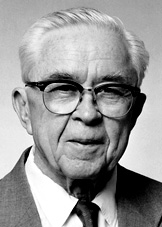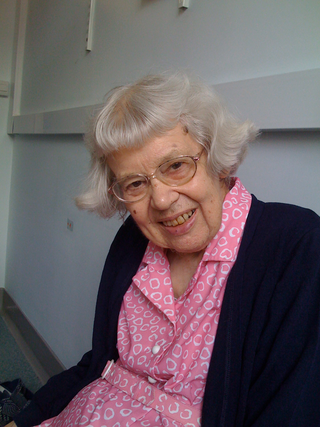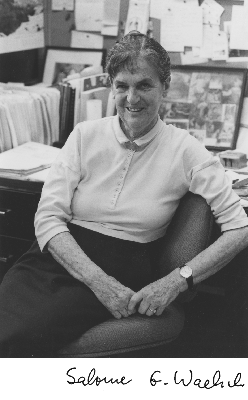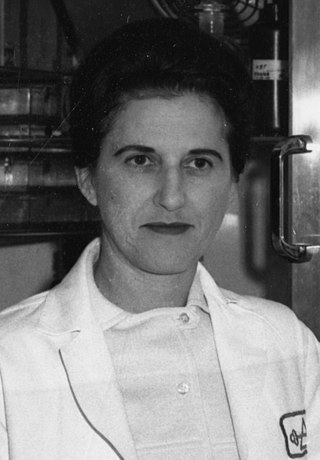
Edward Butts Lewis was an American geneticist, a corecipient of the 1995 Nobel Prize in Physiology or Medicine. He helped to found the field of evolutionary developmental biology.

Mary Frances Lyon was an English geneticist best known for her discovery of X-chromosome inactivation, an important biological phenomenon.

Mario Ramberg Capecchi is an Italian-born molecular geneticist and a co-awardee of the 2007 Nobel Prize in Physiology or Medicine for discovering a method to create mice in which a specific gene is turned off, known as knockout mice. He shared the prize with Martin Evans and Oliver Smithies. He is currently Distinguished Professor of Human Genetics and Biology at the University of Utah School of Medicine.

Salome Gluecksohn-Waelsch was a German-born U.S. geneticist and co-founder of the field of developmental genetics, which investigates the genetic mechanisms of development.

Dame Anne Laura Dorinthea McLaren, was a British scientist who was a leading figure in developmental biology. She paved the way for women in science and her work helped lead to human in vitro fertilisation (IVF). She left an enduring legacy marked by her research and ethical contributions to the field. She received many honors for her contributions to science, including election as fellow of the Royal Society.

Dystonin(DST), also known as bullous pemphigoid antigen 1 (BPAG1), isoforms 1/2/3/4/5/8, is a protein that in humans is encoded by the DST gene.

Tyrosinase-related protein 1, also known as TYRP1, is an intermembrane enzyme which in humans is encoded by the TYRP1 gene.

Sperm-associated antigen 8 is a protein that in humans is encoded by the SPAG8 gene.

Forkhead box protein N1 is a protein that in humans is encoded by the FOXN1 gene.
The Sir William Dunn School of Pathology is a department within the University of Oxford. Its research programme includes the cellular and molecular biology of pathogens, the immune response, cancer and cardiovascular disease. It teaches undergraduate and graduate courses in the medical sciences.

Beatrice Mintz was an American embryologist who contributed to the understanding of genetic modification, cellular differentiation, and cancer, particularly melanoma. Mintz was a pioneer of genetic engineering techniques and was among the first scientists to generate both chimeric and transgenic mammals.
Laura Charlotte Hewitson is a British-born primate researcher noted for her work in the fields of reproductive biology and behavior. She is an affiliate scientist at the Washington National Primate Research Center (WaNPRC) and an adjunct associate professor of psychiatry at the University of Texas Southwestern Medical Center. Additionally, she is the Research Director of the Johnson Center for Child Health and Development in Austin, Texas. Hewitson was a staff scientist at Oregon Health Sciences University from 1997 to 2001. From 2002 to 2010 she was an associate professor of obstetrics, gynecology and reproductive sciences at the University of Pittsburgh School of Medicine and a member of the Magee-Women's Research Institute and Foundation (MWRI&F) in Pittsburgh, Pennsylvania.
Leslie Clarence Dunn was a developmental geneticist at Columbia University. His early work with the mouse T-locus and established ideas of gene interaction, fertility factors, and allelic distribution. Later work with other model organisms continued to contribute to developmental genetics. Dunn was also an activist, helping fellow scientists seek asylum during World War II, and a critic of eugenics movements.

Rosa Susan Penelope Beddington FRS was a British biologist whose career had a major impact on developmental biology.

Elizabeth Jane Robertson is a British developmental biologist based at the Sir William Dunn School of Pathology, University of Oxford. She is Professor of Developmental Biology at Oxford and a Wellcome Trust Principal Research Fellow. She is best known for her pioneering work in developmental genetics, showing that genetic mutations could be introduced into the mouse germ line by using genetically altered embryonic stem cells. This discovery opened up a major field of experimentation for biologists and clinicians.
Margaret Buckingham, is a British developmental biologist working in the fields of myogenesis and cardiogenesis. She is an honorary professor at the Pasteur Institute in Paris and emeritus director in the Centre national de la recherche scientifique (CNRS). She is a member of the European Molecular Biology Organization, the Academia Europaea and the French Academy of Sciences.

Anne Carla Ferguson-Smith is a mammalian developmental geneticist. She is the Arthur Balfour Professor of Genetics and Pro-Vice Chancellor for Research and International Partnerships at the University of Cambridge. Formerly head of the Department of Genetics at the University of Cambridge, she is a Fellow of Darwin College, Cambridge and serves as President of the Genetics Society.
Barbara Hyde Bowman was an American biologist, geneticist, and educator who was known for her research in human blood proteins. Her work characterized variants of globins, the family of proteins responsible for transporting blood in oxygen, and in 1984, Oliver Smithies and she showed that variations in haptoglobins were due to polymorphisms in the HP gene.
Ann Chester Chandley DSc, F.I.Biol., FRSE was an international cytogeneticist with the Medical Research Council unit which became the Human Genetics Unit at the University of Edinburgh. She became a Fellow of the Institute of Biology in recognition of her contribution and a Fellow of the Royal Society of Edinburgh.
This page is based on this
Wikipedia article Text is available under the
CC BY-SA 4.0 license; additional terms may apply.
Images, videos and audio are available under their respective licenses.











